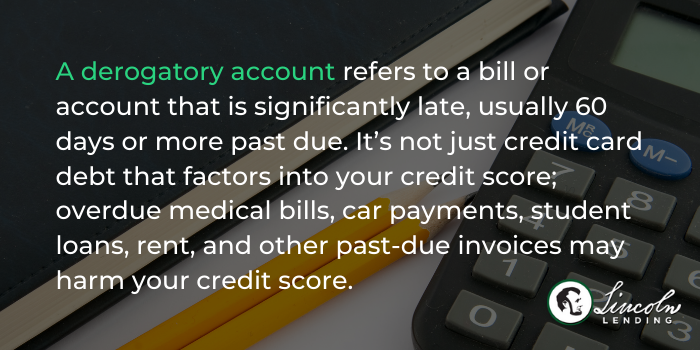Research suggests that over 70 million Americans have an overdue account in collections. And it’s no surprise. Most Americans get their first credit card between the ages of 18 and 20, and many of those cards have interest rates of 15% or higher.
Combined with debt from school loans, medical expenses, and the cost of day-to-day life, it’s easy to find yourself with a bill you can’t pay. However, your credit score plays an essential role in your financial future, so improving that three-digit number is an investment worth making.
But where do you begin? First, let’s look at how a credit score is compiled.
What’s Included in Your Credit Score?
Credit scores range between 300 to 850 and are used as an indicator of your “creditworthiness” to potential lenders.
The following breakdown reflects how most lenders view your credit score:
- Poor: 300 to 579
- Fair: 580 to 669
- Good: 670 to 739
- Very Good: 740 to 799
- Excellent: 800 to 850
Most credit information is collected by three main consumer reporting agencies: Experian, Equifax, and TransUnion. It’s important to note that your credit score isn’t just an indication of how much debt you have.
Factors such as payment history, amounts owed, length of credit history, new credit accounts, and the mix of credit/debts, also affect your credit score.

This bigger picture helps lenders determine if you have risky financial habits that may make it hard for you to repay your loans.
Credit card companies may refuse to issue cards to those with low credit scores, or issue cards with higher than average interest rates. Landlords often check credit scores and may require larger deposits from individuals with poor credit history. Employers may run credit checks on candidates, and the results may impact your job eligibility. Even utility companies may require a cosigner for those with lower credit scores.
So, even if you don’t plan to purchase a home right away, there are several reasons why improving your credit score can improve your life today.
What is a Derogatory Account?
A derogatory account refers to a bill or account that is significantly late, usually 60 days or more past due. It’s not just credit card debt that factors into your credit score; overdue medical bills, car payments, student loans, rent, and other past-due invoices may harm your credit score.

How bad is the impact of a past-due bill?
There really isn’t a “safe” amount of time in which an account can be overdue. In fact, your score may be impacted even a couple of days after a payment is late. However, it’s usually at the 30-day mark that the negative consequences begin to take effect.
Even a single late payment of 30 days or more can stay on your credit report for seven years before it disappears and can result in a drop of 90 points or more.
After 90 days of delinquency, lenders will start to place you in a “high risk” category. This will immediately affect your access to the best interest rates and may result in unsuccessful attempts to secure financing.
The good news? Your credit score is constantly evolving based on your most recent credit activity, so you can rebuild it over time. Also, lenders may overlook one late payment if all of your other recent payments have been on time.
What Does it Mean When a Debt Goes to Collections?
Usually, after 120 days, unpaid debt is sent to a collection agency and “charged off,” meaning that the vendor assumes the bill will remain unpaid.
This, too, will be reported to credit monitoring agencies, worsening the impact on your score.
The number of points your credit score drops when debt enters collections is influenced by your current score – with individuals possessing the best scores taking the biggest hit to their credit.

Sound unfair?
Credit scores help lenders make decisions about who may be a good client for additional loans and services. A sudden reversal in your financial situation is a big red flag to lenders, and your account will be penalized accordingly.
Does this mean all hope is lost?
Not at all!
Every year thousands of Americans pay off debt and start rebuilding credit scores. Even though it can be a long process, it’s definitely worth it!
How Do You Rebuild Your Credit Score After Collections?
Anyone can make a mistake, lose a job, or wind up in a tough financial spot, so don’t beat yourself up. But now it’s time to get proactive.
Some newer credit report models, such as FICO Score 9, show some leniency when you pay off your debts that went to collections. With that in mind, just because the original lender wrote off the debt, you should not. Establish a payment plan if necessary, but pay that bill asap!
Also, since your other bills are still affecting your credit score, get serious about paying every single one on time. One easy way to manage payments is to set them up for automatic payments (when possible) so that you don’t have to try to remember them each month.
If you’re in a difficult financial situation and may be late on other bills, debt consolidation can be an option. However, that approach can also have a negative short-term impact on your credit, so weigh the pros and cons.
Whatever choice you make, it’s also important that you work on the underlying financial habits that caused the debt to go to collections. There is some excellent guidance available online at no cost to help you better track your income and expenses, understand the impact of interest rates, create a practical budget and build a long term financial plan.
Assuming that you’ve taken those steps, what’s next?
Patience.
It can take at least a year to rebuild your credit score. In the meantime, you may want to download a free credit monitoring app, such as Experian, to watch your score improve. Doing this will help you stay motivated as you watch your score climb back up to the top.

The Importance of Your Credit Score to Your Mortgage Interest Rate
So, what happens if you see the home of your dreams tomorrow? You’ve started to rebuild your credit score, and it may even be high enough to qualify for the loan.
Proceed with caution.
One benefit of a high credit score is that it usually helps you to qualify for a lower interest rate – which can save you thousands of dollars over the lifetime of the mortgage.
Let’s do the math:
Depending on the market and your income, a 750 credit score could qualify you for a $225,000, 30-year mortgage loan, with an interest rate of 3.5%. This would result in a monthly payment of $1,010.
With a credit score of 650, your interest rate may be 4% for the same mortgage. This would result in a monthly payment of $1,074.
So, what’s the big deal?
Over the course of your mortgage, that additional $64 a month becomes $23,040! Just think of what you could do with that money!
This doesn’t mean that you should have a “perfect” credit score before you can buy a home. But just consider the impact of a little patience on your financial future before moving forward with your mortgage application.
With hard work and focus, your credit score can be a long-term ticket to a happier and more stable future!

Plan Your Financial Future with Lincoln
Did you know that the Home Loan Coaches at Lincoln can do some quick calculations (without pulling your credit!) to get a rough idea of your mortgage eligibility? As you rebuild your credit score, schedule a no-commitment Home Loan Coaching Session to help you decide if now is the right time to apply for your mortgage.

